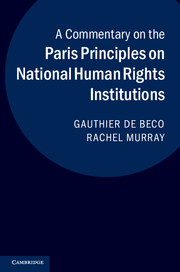Book contents
- Frontmatter
- Contents
- Foreword
- List of abbreviations
- Part I Background: history and challenges
- Part II Commentary principle by principle
- 3 Competence
- 4 Mandate
- 5 Pluralism and representativeness
- 6 Independence
- 7 Working methods and strategy
- 8 Quasi-judicial powers
- 9 Stakeholders
- Part III Twenty years later: the future of the Paris Principles
- Annex I Principles relating to the status of national institutions (The Paris Principles)
- Annex II ICC General observations as at May 20131
- Bibliography
- Index
- References
6 - Independence
from Part II - Commentary principle by principle
Published online by Cambridge University Press: 05 November 2014
- Frontmatter
- Contents
- Foreword
- List of abbreviations
- Part I Background: history and challenges
- Part II Commentary principle by principle
- 3 Competence
- 4 Mandate
- 5 Pluralism and representativeness
- 6 Independence
- 7 Working methods and strategy
- 8 Quasi-judicial powers
- 9 Stakeholders
- Part III Twenty years later: the future of the Paris Principles
- Annex I Principles relating to the status of national institutions (The Paris Principles)
- Annex II ICC General observations as at May 20131
- Bibliography
- Index
- References
Summary
COMPOSITION AND GUARANTEES OF INDEPENDENCE AND PLURALISM
. . .
2. The national institution shall have an infrastructurewhich is suited to the smooth conduct of its activities, in particular adequate funding. The purpose of this funding should be to enable it to have its own staff and premises, in order to be independent of the Government and not be subject to financial control which might affect its independence.
3. In order to ensure a stable mandate for the members of the national institution, without which there can be no real independence, their appointment shall be effected by an official act which shall establish the specific duration of the mandate. This mandate may be renewable, provided that the pluralism of the institution’s membership is ensured.
Independence is central to the Paris Principles and the accreditation of an NHRI. It also goes to the heart of the effectiveness of an NHRI. The value of an independent body is that its distance, conversely, enables it to act as a bridge or mediate between government and non-government entities –a partner – trusted yet separate from both. The Paris Principles set out a range of factors which are supposed to support the independence of an NHRI and against which they are assessed in terms of accreditation. These will be examined below. However, even compliance with the various elements of the Paris Principles may not guarantee independence in practice. An NHRI is an inherently contradictory body when it comes to independence: on the one hand, it is established by the State through the constitution or legislation, and, on the other hand, it is supposed to be independent from it.
Therefore, although the Paris Principles contain provisions relating to funding, functional independence and independence of personnel, it is clear that independence is more than this and a factor with which many grapple. However, given how important it is, one would think it would have been more clearly defined.
- Type
- Chapter
- Information
- Publisher: Cambridge University PressPrint publication year: 2014



